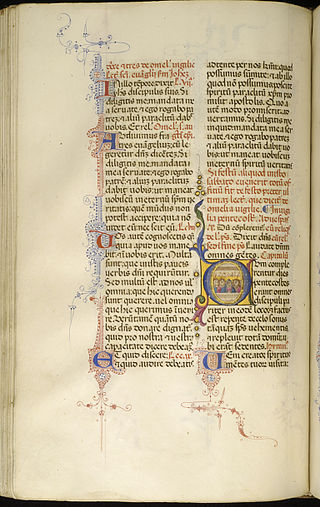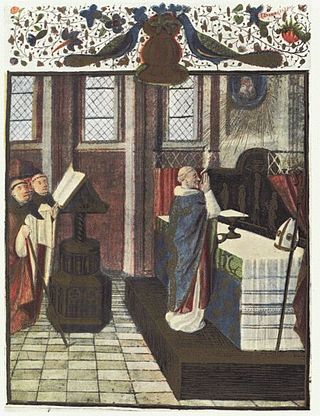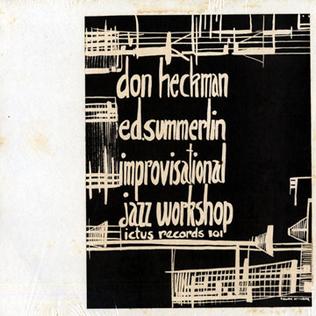
The Roman Breviary is a breviary of the Roman Rite in the Catholic Church. A liturgical book, it contains public or canonical prayers, hymns, the Psalms, readings, and notations for everyday use, especially by bishops, priests, and deacons in the Divine Office.

Mass is the main Eucharistic liturgical service in many forms of Western Christianity. The term Mass is commonly used in the Catholic Church, Western Rite Orthodoxy, Old Catholicism, and Independent Catholicism. The term is also used in some Lutheran churches, as well as in some Anglican churches, and on rare occasion by other Protestant churches.

Vespers is a liturgy of evening prayer, one of the canonical hours in Catholic, Eastern Orthodox, Oriental Orthodox, and Lutheran liturgies. The word for this prayer time comes from the Latin vesper, meaning "evening".

Penance is any act or a set of actions done out of repentance for sins committed, as well as an alternate name for the Catholic, Lutheran, Eastern Orthodox, and Oriental Orthodox sacrament of Reconciliation or Confession. It also plays a part in confession among Anglicans and Methodists, in which it is a rite, as well as among other Protestants.

Hallelujah is an interjection from the Hebrew language, used as an expression of gratitude to God. The term is used 24 times in the Hebrew Bible, twice in deuterocanonical books, and four times in the Christian Book of Revelation.

Compline, also known as Complin, Night Prayer, or the Prayers at the End of the Day, is the final prayer liturgy of the day in the Christian tradition of canonical hours, which are prayed at fixed prayer times.

Matins is a canonical hour in Christian liturgy, originally sung during the darkness of early morning.

Anglican church music is music that is written for Christian worship in Anglican religious services, forming part of the liturgy. It mostly consists of pieces written to be sung by a church choir, which may sing a cappella or accompanied by an organ.
The Covenant Renewal Service, or simply called the Covenant Service, was adapted by John Wesley, the founder of Methodism, for the purpose of the renewal of the Christian believer's covenant with God. Wesley's Directions for Renewing Our Covenant with God, first published in 1780, contains his instructions for a covenant service adapted from the writings of Richard Alleine and intended for use in Methodist worship as "a means of increasing serious religion." The first such service was held on 11 August 1755, in London.

In Christianity, worship is the act of attributing reverent honour and homage to God. In the New Testament, various words are used to refer to the term worship. One is proskuneo which means to bow down to God or kings.

The Liturgy of the Hours, Divine Office, or Opus Dei are a set of Catholic prayers comprising the canonical hours, often also referred to as the breviary, of the Latin Church. The Liturgy of the Hours forms the official set of prayers "marking the hours of each day and sanctifying the day with prayer." The term "Liturgy of the Hours" has been retroactively applied to the practices of saying the canonical hours in both the Christian East and West–particularly within the Latin liturgical rites–prior to the Second Vatican Council, and is the official term for the canonical hours promulgated for usage by the Latin Church in 1971. Before 1971, the official form for the Latin Church was the Breviarium Romanum, first published in 1568 with major editions through 1962.
Nones, also known as None, the Ninth Hour, or the Midafternoon Prayer, is a fixed time of prayer of the Divine Office of almost all the traditional Christian liturgies. It consists mainly of psalms and is said around 3 pm, about the ninth hour after dawn.
The Divine Service is a title given to the Eucharistic liturgy as used in the various Lutheran churches. It has its roots in the Pre-Tridentine Mass as revised by Martin Luther in his Formula missae of 1523 and his Deutsche Messe of 1526. It was further developed through the Kirchenordnungen of the sixteenth and seventeenth centuries that followed in Luther's tradition.
In Christian liturgical worship, Preces, also known in Anglican prayer as the Suffrages or Responses, describe a series of short petitions said or sung as versicles and responses by the officiant and congregation respectively. Versicle-and-response is one of the oldest forms of prayer in Christianity, with its roots in Hebrew prayer during the time of the Temple in Jerusalem. In many prayer books the versicles and responses comprising the Preces are denoted by special glyphs:
The St Mark Passion of Charles Wood is a musical composition written in 1920. The work calls for solo tenor (Evangelist), solo baritone (Jesus), chorus and organ, as well as minor roles for five solo basses, a solo treble (Maid), and a solo treble or alto. It was composed while Wood was employed at Gonville and Caius College, Cambridge and lasts on average around an hour.

A liturgical book, or service book, is a book published by the authority of a church body that contains the text and directions for the liturgy of its official religious services.
Edgar Eugene Summerlin was an American jazz saxophonist, composer, and educator known for pioneering Liturgical jazz, avant-garde jazz, and free jazz.

The Don Heckman–Ed Summerlin Improvisational Jazz Workshop is the first and only album released by the group of the same name, led jointly by alto saxophonist Don Heckman and tenor saxophonist Ed Summerlin, recorded in September 1965 and March 1966, and released in 1967 on their own, recently established Ictus label, with Heckman and Summerlin each composing two of the album's four tracks. The eponymous LP would be re-released the following year on the English Jazz Workshop label as Jax or Bettor.

Ring Out Joy is the third album by tenor saxophonist Ed Summerlin, recorded in April 1968 and released later that year on the Avant-Garde label. The album marks a return to the religious concerns that characterized Summerlin's 1960 debut LP, Liturgical Jazz.
The Daily Office is a term used primarily by members of the Episcopal Church. In Anglican churches, the traditional canonical hours of daily services include Morning Prayer and Evening Prayer, usually following the Book of Common Prayer. As in other Christian traditions, either clergy or laity can lead the daily office. Most Anglican clergy are required to pray Morning and Evening Prayer daily.












